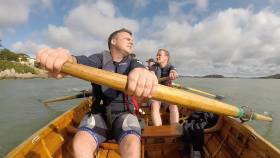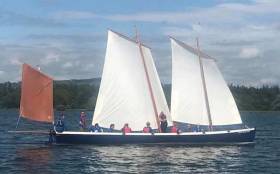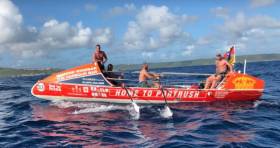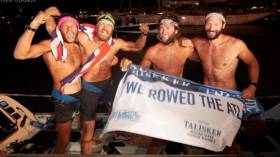Displaying items by tag: Atlantic Challenge
It was Conor O’Brien of Foynes who said the main purpose of cruising should be to sail to islands. So it’s appropriate that a Foynes Yacht Club cruiser-racer owner, Joe Kiernan, is suggesting that there are enough islands along the Western Seaboard to provide interesting courses for a sort of Race/Rally series to be called the Atlantic Cup, to be undertaken with the blessing of the West of Ireland Offshore Racing Association (WIORA) in August over three weekends starting 24th August.
By that time, he and his family will have sailed their newly-acquired First 44.7 back from The Netherlands to Foynes, and they’ll be looking to demonstrate her pace. For much and all as family cruising is the primary purpose, in times past Joe crewed aboard John Maybury’s champion J/109 Joker II from Dun Laoghaire, and he’s hot to trot.
 Hot to trot. The Kiernan family’s newly-acquired First 44.7 sailing in Dutch waters
Hot to trot. The Kiernan family’s newly-acquired First 44.7 sailing in Dutch waters
CLIFFS OF MOHER
That said, in his initial proposals only one island will be involved as a stopover port, at the Aran Islands. Three eminently manageable races are planned for the Atlantic Challenge’s inauguration: 1:Foynes to Fenit; 2:Fenit to Aran Islands; 3:Galway to Kilrush.
The concluding Galway-Shannon Estuary leg is interesting unless an offshore mark such as Inis Oirr is stipulated, for in its suggested form, the course will take the competitors close past Black Head and in along the Cliffs of Moher towards Loop Head - nearly all decidedly steep-to or vertical except around Mutton Island and Quilty and Doonbeg.
As competitors in the Dun Laoghaire to Dingle Race have learned, if you sail too close to the steep ocean side of Valentia Island, there are all sorts of wind cushions and a confused backwashed sea if you get near in near the cliffs. But it would certainly add to the sport to allow each crew in the Atlantic Challenge to judge for themselves how much they can cut the corners.
 An entertaining bit of coast to race along – the Cliffs of Moher are along the direct track from Galway to Loop Head
An entertaining bit of coast to race along – the Cliffs of Moher are along the direct track from Galway to Loop Head
INTEREST HIGH IN FOYNES
Interest in Foynes is high, having been shown by Ray McGibney (formerly of the Dehler 101 Disarray) who has bought Joe’s previous boat the Sigma 38 Gambit, as well as Ian Madden with the Elan 40 Elantic, and Derek Dillon with the new Big Deal, a Grand Soleil 37 – the previous Big Deal was a Round Ireland Two-Handed Class winning Dehler 34. As well, “export member” Kenny Cunnane, who keeps his Swan 46 Mynx at Dingle, is in the frame.
Now they’re casting a fly over folks to the north all the way to Sligo and Mullaghmore, and if you’re at all interested, give Joe Kiernan a call on 087-276 8740.
Irishmen in Young Crew of Innovators Who Conquered 3,000-Mile Row Across the Atlantic
On Thursday (18 January) an energetic mix of family, friends and supporters gathered in eager anticipation for the arrival of the first runners-up in the World’s Toughest Row – Atlantic 2023 at the historic Nelson’s Dockyard in Antigua’s English Harbour.
Among the roars of the crowd and blaring of superyacht sirens, Team Out of the Blue received a triumphant reception back on to terra firma after conquering this year’s World’s Toughest Row – Atlantic in a time of 36 days, four hours and 30 mins.
Team Out of The Blue comprises Amir Anwar-Hameed from Bray and Mark Bolger from Sandymount with Marko Rehbein from Germany and Paul Heijnen from the Netherlands, all four of whom live in the Dutch city of Delft.
They brought together their combined expansive knowledge of strategic product design, aerospace engineering and sustainability to undertake what was arguably their most enduring enterprise ever.
 From left: Amir Anwar-Hameed, Mark Bolger, Paul Heijnen and Marko Rehbein celebrate reaching terra firma after more than 36 days rowing the Atlantic Ocean | Credit: World’s Toughest Row
From left: Amir Anwar-Hameed, Mark Bolger, Paul Heijnen and Marko Rehbein celebrate reaching terra firma after more than 36 days rowing the Atlantic Ocean | Credit: World’s Toughest Row
When asked about their experience rowing across the Atlantic, Bolger said: “We were lucky with the wildlife, lots of dolphins, tunas jumping and whales. Incredible sights.”
The four young men won the fours class in this year’s race and when asked about whether there have been talks onboard about any future adventures, skipper Anwar-Hameed said: “We need to get our careers going and get settled, but in five years we might figure something out and I would gladly do anything with these guys!”
Team Out of the Blue have been raising money and awareness for the charities MIND Us, Jigsaw and Reef Support Foundation. And at the same time, throughout their crossing they brought attention to the importance of using citizen science by collecting ocean data to validate a student funded AI-powered ocean monitoring tool to protect and maintain marine coastal areas.
Two Irishmen Embark on Rowing Challenge Across the Atlantic
Two Irish men are undertaking the world’s toughest row across the Atlantic in a 30-day, unassisted, non-stop row, known as the Atlantic Challenge, from the Canary Islands to Antigua starting Wednesday, 13 December 2023.
Sailor Mark Bolger from Sandymount in County Dublin and Amir Anwar Hameed from Bray are in the final stages of preparation before crossing the start line at 8 am at La Gomera in the Canary Islands.
They, along with their two Dutch teammates, Marko Rehbein and Paul Hejnen, will row 4,800 kilometres across the Atlantic Ocean, hopefully arriving in January at Nelsons Boatyard in Antigua.
Their preparations have included providing food supplies for 55 days in case of adverse weather conditions. All food is freeze-dried to save on weight, and as each team member will burn in excess of 5000 calories a day, consuming calories is a major concern.
On average, a rower loses over 8 kg rowing the Atlantic with in excess of 1.5 million oar strokes during a race.
At its deepest, The Atlantic Ocean is 8.5km deep, and the rowers can expect to experience waves up to 20 ft high.
Conditions onboard the rowing boat are very meagre in order to save on weight so they can go faster. There is no toilet onboard; the boys will use a bucket! They will also do two hours on watch and two hours off.
Their off time is not just for rest as they will have to desalinate water and heat it to prepare their meals during their off period. They estimate that in reality it will be two hours rowing, one hour eating and one hour sleeping.
About 'Team Out of the Blue'
A chance connection on social media in 2022 brought Amir Anwar Hameed from Bray and Mark Bolger from Sandymount together, having not been in contact for seven years since they left school.
Amir, who studied Aerospace Engineering at Delft University in the Netherlands, has no rowing experience yet came up with the idea with his flatmate, Marko, to take on the World’s Toughest Row as Amir is a firm believer that anything is possible with a strong vision.
When Amir announced his campaign on social media, Mark congratulated him & offered to support Amir in his challenge, little did he realise that one message would lead him to moving to Delft in March 2023 to train. Mark has been a competitive sailor since the age of 6 & following his studies at Trinity & UCD, he has been working as a sustainably specialist for Irish & EU projects.
The Team was then joined by Paul a third Aerospace Engineer who is a competitive rower and Team Out of the Blue was born & are now in full time training to take on the biggest challenge of their lives rowing 4800km across the Atlantic Ocean.
Amir says, ‘There is no doubt that we will reach our physical limits, but it is our Team's spirit and mental resilience that will be tested above all. We realized that the same uncertainties we will face on the ocean are experienced by young people around us everyday and as a result we are taking on this challenge to promote the means to tackle our mental health, such as open communication, empathy and awareness for mental health while raising funds for our charities MIND Us (Netherlands) and JIGSAW (Ireland) that provide essential support to young people.
A New Atlantic Challenge for Bantry in West Cork
The Atlantic Challenge group at Bantry is working on a new development project for a marine centre in the West Cork town which would encourage more young people to become involved in the maritime sphere.
The Atlantic Challenge International began in 1984 to bring young people from different nations together in competitions through friendly contests to preserve and sustain traditional seamanship skills.
The Atlantic Challenge longboat can be rowed and sailed, though when sailed, it depends on the weight of the crew to balance the boats, which don’t have keels underneath to steady them. I once sailed in the Bantry longboat, and it was quite an experience, moving from side to side to keep it upright.
 The message of the Atlantic Challenge
The message of the Atlantic Challenge
The longboats hearken back to the attempted French invasion of Ireland at Bantry Bay in West Cork when Wolfe Tone was aboard the invasion fleet and the boats would have been used to land the invasion force, but that didn’t happen, gales decimated it and never invaded.
The longboats are replicas of the original, dating back to the late 1700s. There are now a hundred of them around the world. The original was restored and is displayed in the National Museum at Collins Barracks in Dublin.
Diarmuid Murphy of the Atlantic Challenge Bantry group has been telling me about their plans for a marine development programme in Bantry and the next Atlantic Challenge event in Belfast next year. There had been a plan to hold it in Russia, but Putin’s invasion of Ukraine scuppered that.
In this week’s podcast, my guest is Diarmuid Murphy. Listen below.
Irish Rowing Crew Set New Record for Fastest Atlantic Crossing
An Irish rowing crew have set a new record for the fastest Atlantic crossing, as RTÉ News reports.
The five-man team from Row Hard or Go Home rowed from the Canary Islands to Antigua in the West Indies in 33 days, 12 hours and 38 minutes as part of the Talisker Whisky Atlantic Challenge.
On arrival in Antigua’s Nelson’s Dockyard on Saturday evening (14 January), the team of Tom Nolan, Diarmuid Ó Briain, Shane Culleton, Gearoid O’Briain and Derek McMullen smashed the previous five-rower transatlantic record by more than two days.
They were greeted on arrival by family and friends after a month at sea to raise funds or the RNLI and Laura Lynn Children’s Hospice.
And they’re not the only Irish interest in the challenge, with a four-rower team also under the Row Hard or Go Home banner still making way with some 100 nautical miles to go, while Jamie Carr is second in the solo rower standings in the mid Atlantic.
RTÉ News has more on the story HERE.
Irish/British Rowers Set New World Record in Atlantic Challenge
An Irish/British duo with no prior rowing experience have set a world record as the fastest women’s pair to row across the Atlantic, according to Row Report.
Jessica Oliver — who has Irish connections — and Charlotte Harris set a time of 45 days, seven hours and 25 minutes in the Talisker Whiskey Atlantic Rowing Challenge.
They arrived in Antigua and Barbuda last Wednesday 26 January at the end of a gruelling 3,000-natical-mile route from the Canary Islands.
The pair, who have so far raised more than £43,000 (€51,500) for their chosen charities, set a record-worthy pace in their boat Wild Waves despite the lack of following wind, not to mention dealing with a capsize mid-ocean — and a perilous shark encounter.
They’re not the only British/Irish pair in the transatlantic challenge, meanwhile, as the Tideway Odyssey duo of Saf Greenwood and Victoria Carroll — granddaughter of rowing coach Noel Casey — are less than 430 nautical miles from the finish.
Row Report has more on the story HERE.
Irishmen Learn Rowing to Prepare for Atlantic Challenge
An Irish crew, the Salty Pair, will row the Atlantic ocean next year. Dubliners Rob Collins and Kev O’Farell will be part of the Talisker Whiskey Atlantic Challenge, which is set to leave the Canary Islands in mid December heading for Antigua.
Both men have backgrounds in scouting and outdoor activities, though not in rowing. They joined St Michael’s coastal rowing club in Dublin to learn to row in preparation for the Atlantic challenge.
In May of this year they completed in a skiff in the Celtic Challenge, a 150km rowing race from Arklow to Aberystwyth. They also competed in the Hobblers Challenge, a 28km race around Dublin Bay.
When you’ve classic 38ft ten-oared rowing-and-sailing gigs of impeccable 1790 design origins, you would think an exceptional coach would be needed to bring the crew to a peak of performance in order to win a major international challenge which has been run biennially since 1986, writes W M Nixon.
Not so, it would seem. Or certainly not so in the town of Antrim on the northeast corner of Lough Neagh in Northern Ireland.
There, you’ll find the local hotbed of gig rowing, where they’ve just completed the staging of the 2018 Atlantic Challenge with eleven teams from both sides of the Atlantic. At the end of it, the home team has won overall in an event of many prizes, so naturally, it’s being asked who was their coach, as the team is drawn from a panel of 16, including ten oarsmen and women. And the answer is that they are self-coached.
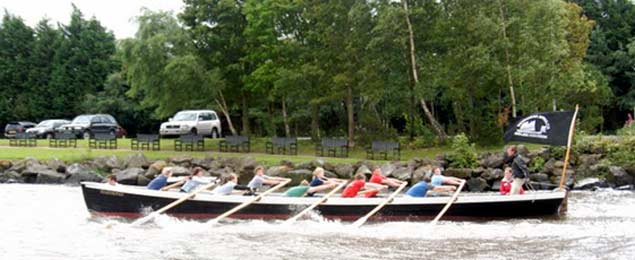 Pulling like dogs……the champion team hard at work
Pulling like dogs……the champion team hard at work
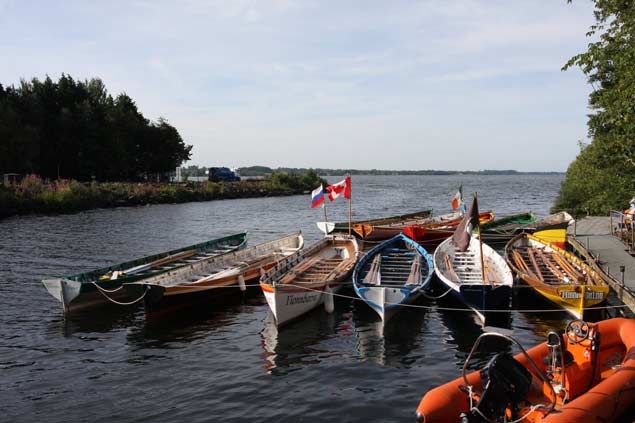 The fleet in the river at Antrim. Some far-travelled crews were provided with boats from other Irish gig-rowing centres
The fleet in the river at Antrim. Some far-travelled crews were provided with boats from other Irish gig-rowing centres
Rowing and sailing one of these gigs involves a high level of teamwork. It’s training to top navy level, and most people know them as the “Bantry Boats”, as they’re based on the Admiral’s Gig left behind on Bere Island after the unsuccessful French invasion of Bantry Bay in 1796, and now in the Collins Barracks section of the National Museum in Dublin.
But whatever they’re called these days, the Atlantic Challenge has given them an entirely new lease of life. And thanks to American maritime philanthropist Lance Lee, since 1986 it has become something which gives treble focus, as building the gigs, maintaining them, and then using them actively and effectively afloat, is a community effort of the highest order.
Add in the international element, and you have something very special indeed, with hospitable Antrim Boat Club providing a focal point with ready access to the wide open spaces of Lough Neagh, which is so extensively our largest lake that the Russian and Danish crews were reminded of the Baltic.
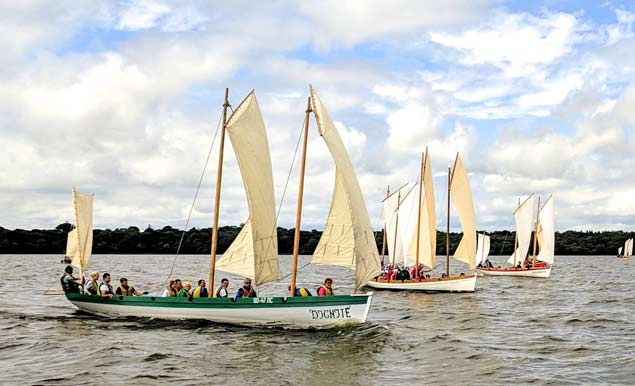 Closing in on the start
Closing in on the start
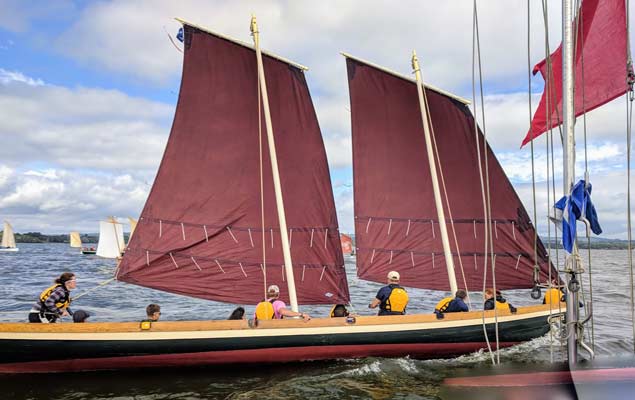 Competition was close for the best place at the windward end of the starting line
Competition was close for the best place at the windward end of the starting line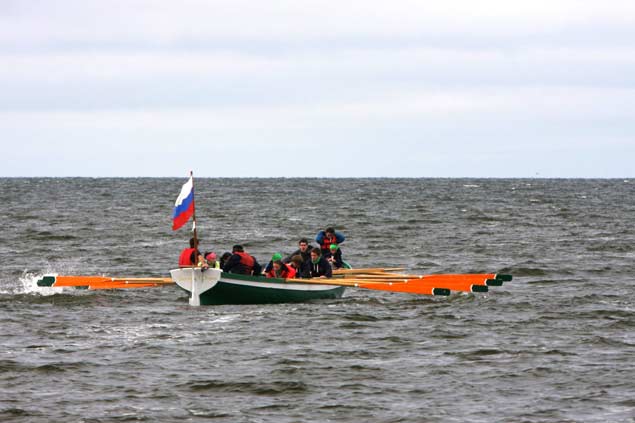 The Russian crew found that Lough Neagh could well match the Baltic
The Russian crew found that Lough Neagh could well match the Baltic
 Summer returns to hospitable Antrim Boat Club
Summer returns to hospitable Antrim Boat Club
With the heatwave drawing to its close, Lough Neagh also served up a variety of conditions to test every crew in a wide variety of ways, from rowing to sailing races and all sorts of special challenges thrown in - so much so that it’s officially described as a Seamanship Contest, and it’s quite a complex one at that, as you can see by considering the score-card:
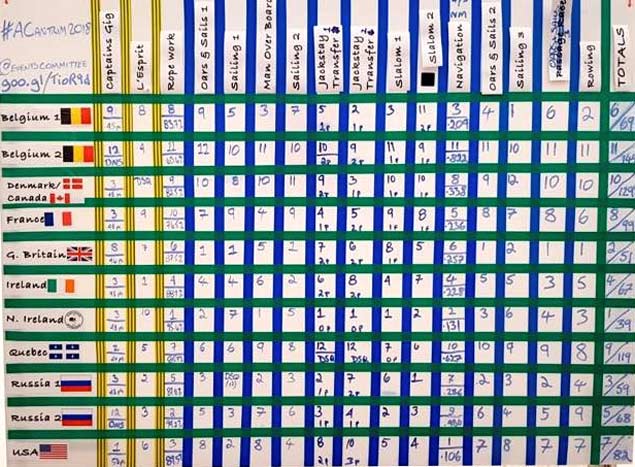
Like all the best things to do with boats, it’s much more rewarding to be a participant than a spectator, and the Atlantic Challenge provides so many special experiences afloat and camaraderie ashore that it’s in a league of its own.
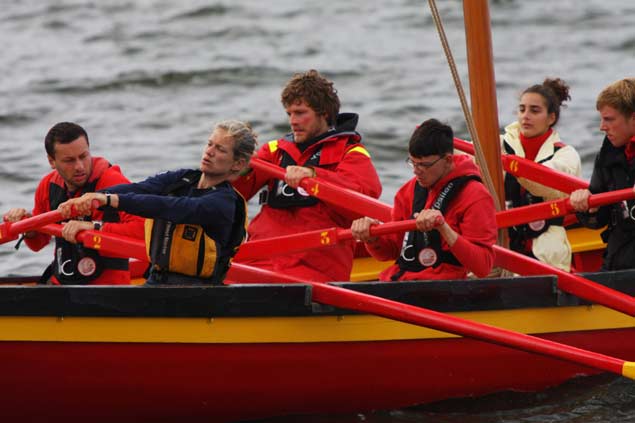 “…it’s much more rewarding to be a participant than a spectator….”
“…it’s much more rewarding to be a participant than a spectator….”
But organising it is a major challenge. For although it is well understood by those who take part and their supporters, how on earth do you go about explaining to the previously-uninformed powers-that-be that you’d like their township to host such an event? They could become understandably confused when you say it involves a bit of rowing and a lot of team-work and a bit of sailing and an awful lot of increasingly skilled seamanship with people speaking a dozen different languages.
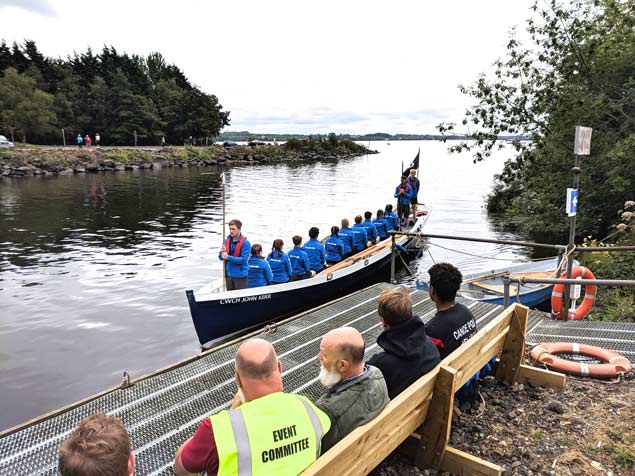 Coming neatly alongside with oars stowed in perfect order is one of the tests, and this is the winning team doing it in style
Coming neatly alongside with oars stowed in perfect order is one of the tests, and this is the winning team doing it in style
So all congratulations to Organising Committee Chairman Charlie McAllister and his wife Marian who was the secretary, and to their many volunteers, all of whom had enough on their plate without having to think about who was making sure that the home crew was going to be in perfect condition for the event. Which wasn’t a bother, for it really is the fact that all the crew’s training was self-coached.
It was mutual support amongst the team which encouraged them to self-assemble each morning during the days and weeks beforehand for a 7.0 am training session, and it was mutual monitoring and encouragement which had them in exactly the right frame of mind and top physical condition as the week-long contest got under way.
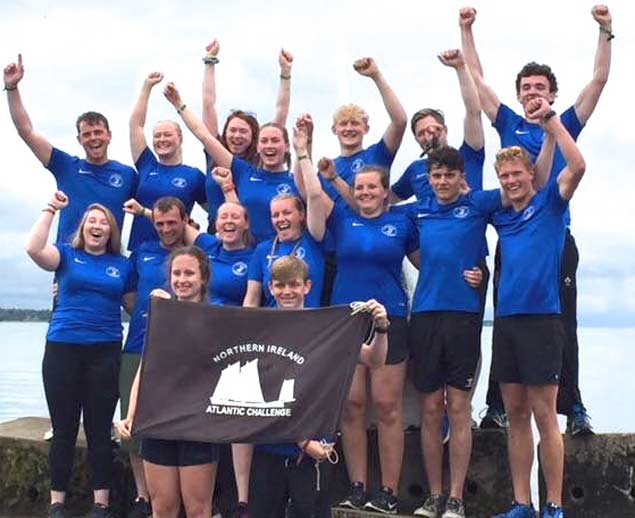 The winning team celebrate - their secret of success was self-coaching and mutual monitoring
The winning team celebrate - their secret of success was self-coaching and mutual monitoring
We can probably all learn from this. The Northern Ireland team were led by Katie McAllister with Mike Patton as cox, and the squad included Josh Montgomery, Laura Lynch, Becky McAllister, Eva Hirst, Michael McAllister, Danny Allen, Ollie Allen, Kathy Patton, Jenny Madden, Chris Knocker, Rory McKnight, Fiona McClean, Rachael McClean and Finton Farrago.
The next Atlantic Challenge in 2020 will be at St Petersburg in Russia, but meanwhile, before we start preparing for that, here are the 2018 results in detail:
Lance Lee trophy:
Unité L’esprit crew.
Irish crew.
Captains gig:
Team USA.
The John Kerr seamanship award:
Team USA.
Fair play award:
Ireland.
The spirit of Atlantic challenge:
Team USA.
The Mary Whitewright award:
Amalie Uni Ekdal, Denmark.
Third place:
Russia 1.
Second place:
Great Britain.
WINNER of AC 2018
Northern Ireland.
Home to Portrush Row Across the Atlantic
#Rowing: Home to Portrush rowed into English Harbour on Sunday to finish fifth in the Atlantic Challenge race from the Canaries. The crew of George McAlpin, Ally Cooper, Gareth Barton and Luke Baker took just a month to complete the race, which started on December 14th in La Gomera. They finished fifth overall. Organisers say their row took 31 days eight hours and 57 minutes, which was inside the previous best time for the race. They received a raucous welcome from family and friends on the dock when they landed.
Four Oarsmen Win Atlantic Race in Record-Breaking Time
The first boats have finished the Atlantic Challenge ocean rowing race. The Four Oarsmen from Britain won in a record time of 29 days and 15 hours, which the organisers say is the fastest time ever for a row across the Atlantic Ocean. Team Antigua and Swiss Mocean also finished on Saturday in the race from the Canaries to Antigua in the West Indies which is sponsored by Talisker Whisky.
These three fours will be followed in by solo oarsman Mark Slats in Row4Cancer.
Two boats from Ireland are next in line. Home to Portrush is set to take fifth place, most likely arriving on Sunday. Relentless, a four drawn from Cork and Dublin, should finish on Monday or Tuesday.



























